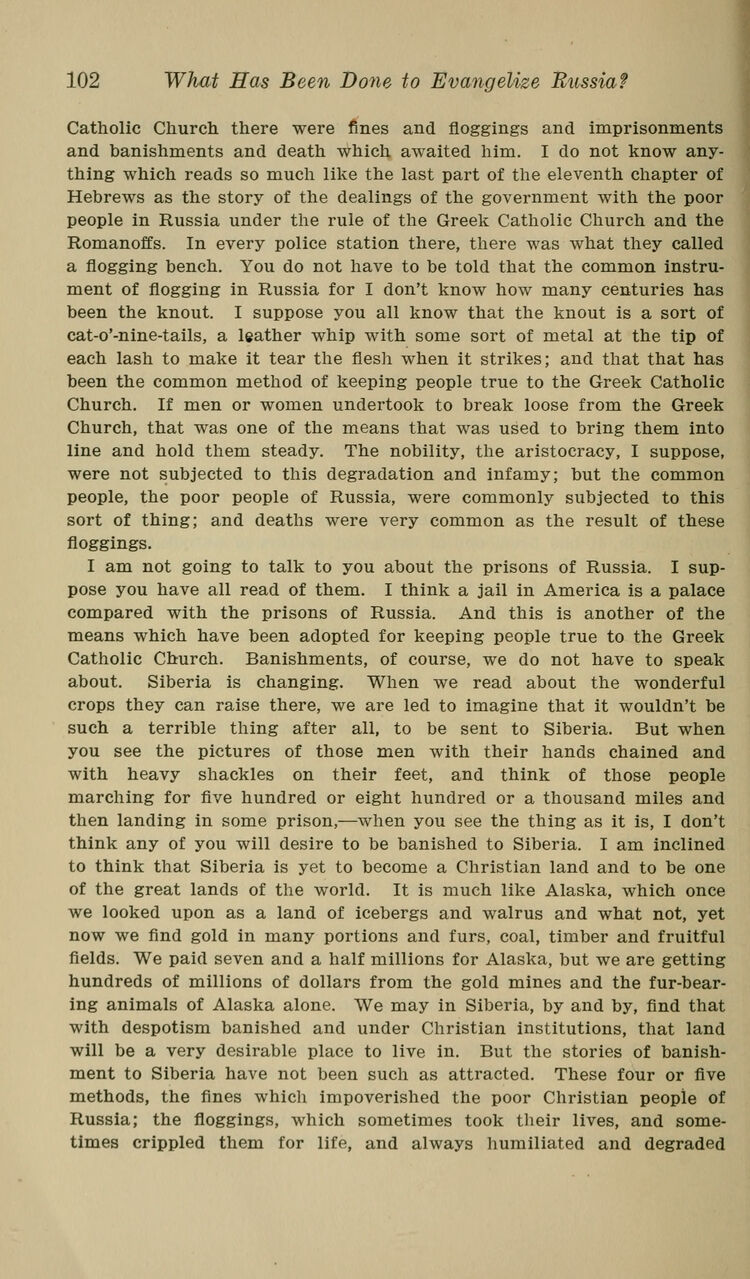
Full resolution (JPEG) - On this page / på denna sida - What Has Been Done to Evangelize Russia? The Rev. Chas. A. Blanchard, D. D. - 300 Years Under Romanoffs

<< prev. page << föreg. sida << >> nästa sida >> next page >>
Below is the raw OCR text
from the above scanned image.
Do you see an error? Proofread the page now!
Här nedan syns maskintolkade texten från faksimilbilden ovan.
Ser du något fel? Korrekturläs sidan nu!
This page has never been proofread. / Denna sida har aldrig korrekturlästs.
102 What Has Been Done to Evangelize Russia?
Catholic Church there were fines and floggings and imprisonments
and banishments and death which awaited him. I do not know any-
thing which reads so much like the last part of the eleventh chapter of
Hebrews as the story of the dealings of the government with the poor
people in Russia under the rule of the Greek Catholic Church and the
Romanoffs. In every police station there, there was what they called
a flogging bench. You do not have to be told that the common instru-
ment of flogging in Russia for I don’t know how many centuries has
been the knout. I suppose you all know that the knout is a sort of
cat-o’-nine-tails, a leather whip with some sort of metal at the tip of
each lash to make it tear the flesh when it strikes; and that that has
been the common method of keeping people true to the Greek Catholic
Church. If men or women undertook to break loose from the Greek
Church, that was one of the means that was used to bring them into
line and hold them steady. The nobility, the aristocracy, I suppose,
were not subjected to this degradation and infamy; but the common
people, the poor people of Russia, were commonly subjected to this
sort of thing; and deaths were very common as the result of these
floggings.
I am not going to talk to you about the prisons of Russia. I sup-
pose you have all read of them. I think a jail in America is a palace
compared with the prisons of Russia. And this is another of the
means which have been adopted for keeping people true to the Greek
Catholic Church. Banishments, of course, we do not have to speak
about. Siberia is changing. When we read about the wonderful
crops they can raise there, we are led to imagine that it wouldn’t be
such a terrible thing after all, to be sent to Siberia. But when
you see the pictures of those men with their hands chained and
with heavy shackles on their feet, and think of those people
marching for flve hundred or eight hundred or a thousand miles and
then landing in some prison,—when you see the thing as it is, I don’t
think any of you will desire to be banished to Siberia. I am inclined
to think that Siberia is yet to become a Christian land and to be one
of the great lands of the world. It is much like Alaska, which once
we looked upon as a land of icebergs and walrus and what not, yet
now we find gold in many portions and furs, coal, timber and fruitful
fields. We paid seven and a half millions for Alaska, but we are getting
hundreds of millions of dollars from the gold mines and the fur-bear-
ing animals of Alaska alone. We may in Siberia, by and by, find that
with despotism banished and under Christian institutions, that land
will be a very desirable place to live in. But the stories of banish-
ment to Siberia have not been such as attracted. These four or five
methods, the fines which impoverished the poor Christian people of
Russia; the floggings, which sometimes took tlieir lives, and some-
times crippled them for life, and always humiliated and degraded
<< prev. page << föreg. sida << >> nästa sida >> next page >>